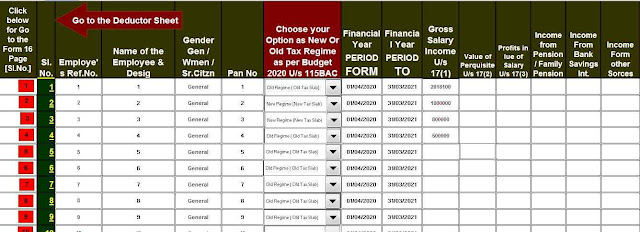Sections 80TTA and 80TTB- How to earn tax-free interest- With Automated Income Tax Form 16 Part B for the F.Y.2020-21
Sections 80TTA and 80TTB- How to earn tax-free interest. This can be very frustrating when we are not able to get a full return on our investment. We are talking about interest relief from the income. This article will provide information on how to earn tax-free interest of Rs. 100,000 / - for one year in case of an individual (excluding senior citizens) and in the case of HUF and how to earn Rs.50,000/-
In the case of senior citizens, the government introduced 80 TTAs under the Income Tax Act to provide discounts and reliefs up to Rs 10,000 on the interest income from savings accounts under the 80 TTB section. Discount details are as follows:
You may also, like- Prepare One by One Income Tax Form 16 Part A&B and Part B Form the F.Y.2020-21
Deduction in case of interest - Session 80 TTA and 80 TTB
Section 80TTA:
1. Where an individual or a Hindu Undivided Family earns interest on a savings account (not a time deposit) -
A banking entity (including any bank or banking institution referred to in section 51 of the Act) that enforces the Banking Regulation Act, 1949 (10 of 1949);
Or
A post office defined in section (k) of section 2 of the Indian Post Office Act, 1898 (6 of 1898),
The total amount of ten thousand rupees whichever is less, allowed as a discount from the total income.
You may also, like- Prepare One by One Income Tax Form 16 Part B Form the F.Y.2020-21
1. The upper part of the 80 TTA does not apply to senior citizen exemptions. In the case of senior citizens, exemptions are allowed under Section 80TTB. According to this section, actual interest or Rs. 50,000 whichever is less, earned on a deposit with a bank, co-operative society, or a post office mentioned above, will be available as a deduction in case of F.Y201-1.
2. In the case of senior citizens, the deposit may include a deposit in the savings account, a recurring deposit in the account; Double Benefit Deposits, Term Deposits, Monthly Income Certificates, etc. This amount can be deposited by the Assessor before the age of 60 years. Once he has attained the age of 60 years in the previous year, he may claim a rebate in respect of interest earned that year under section 80TTB.
You may also, like- Prepare at a time 50 Employees Form 16 Part B Form the F.Y.2020-21
3. In the case of senior citizens, the interest earned on the deposit is covered but in the case of individuals (other senior citizens) and in the case of HUFs, the interest earned through account keeping is covered only. Further amounts of interest rebate are allowed at Rs.10,000 and Rs.50,000 respectively
Treatment of both exemption in Income Tax Return (ITR):
1. The above interest should first be offered as income i.e. it should be added to the total income at the time of filing the return of income and a separate discount should be claimed as described above.
2. Discounts need to be calculated under both categories. This means that from all sources there should not be more than a specific discount in the section relating to the nature of interest mentioned above.
3. Where income as described in section 80 TTA or 80 TTB is derived from or on behalf of a firm, person, organization or entity, respectively, from any savings account or any deposit of deposit, no discount shall be waived by any partner or association of the firm under this section. The calculation of the total income of a member or a person of the body will be allowed with the consent of such income.
You may also, like- Prepare at a time 100 Employees Form 16 Part B Form the F.Y.2020-21
Definition:
1. Time Deposit: For the purposes of this section (80 TTA), "Time Deposit" means the deposits are repayable after the expiry of a certain period of time. I.e. interest earned on fixed deposit and recurring deposit is not allowed as a discount under this section for individual and HUF (excluding interest included in section 80TTB).
2. Senior Citizen: For the purpose of this section (80 TTB), "Senior Citizen" means a person resident in
Deduction comparisons under both categories are provided below:
1. In the case of individual citizens (excluding senior citizens) and HUF accounts, a rebate of Rs. 10,000 is allowed. Till now the banks are saving the interest on the bank account so if the annual interest is less than Rs. You can check the latest FD rates in the Economics Times.
You may also, like- Prepare at a time 50 Employees Form 16 Part A&B Form the F.Y.2020-21
2. In the case of fixed deposits which typically provide interest for a period of more than 180 days, the effective return post-tax will be only 4.2% to 4.9% (assuming a 30% tax falls) buckets and surcharges and HEC extra). This can be a good investment and allows for better liquidity and protection than investing in equity markets or other high-risk investments.
3. In the case of senior citizens it includes the issue of total interest on the deposit so it is not advisable for senior citizens to invest in high-risk investments. Deposit interest up to Rs 50,000 is available. It will provide tax-free income through discounts as described earlier.
Conclusion - Section 80 TTA and 80 TTB: So go and open an account in a bank that pays maximum interest income for availing this tax exemption as per Section 80 TTA and 80 TTB for maximum interest income.






No comments:
Post a Comment